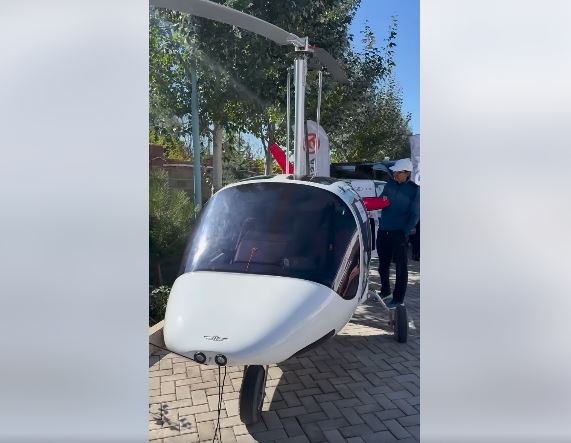Viewing results 1 - 6 of 186
Tajikistan and Russia are studying the possibility of jointly exploiting oil and gas fields in Tajikistan. At the intergovernmental commission meeting held in Dushanbe, Tajikistan's Prime Minister, Kohir Rasulzoda, and the Deputy Chairman of the Russian Government, Marat Khusnullin, discussed the development of mines. “We have given the Russian side a list of promising oil and gas fields in Tajikistan for joint development. We propose to continue working on finding common ground to implement a mutually beneficial project in this area,” Rasulzoda said. He said the Russian side's opinions were considered when making this decision. The Statistical Agency of Tajikistan provides information that in 2023, about 18,000 tons of oil were produced in the country, which isn’t enough to supply oil refineries. In this regard, oil products are imported to Tajikistan. Russia, the leading supplier, provides gasoline and diesel to Tajikistan without customs fees.
Kyrgyzstan plans to abandon coal imports within the next two years and stop buying foreign electricity by 2027. Speaking at a parliamentary group meeting, Energy Minister Taalaibek Ibraev announced that the country is already preparing to meet these challenges by actively developing the energy sector's infrastructure. Ibraev emphasized that the problem with transformers, which was relevant earlier, will be solved next year. Repairs have already been carried out in all 56 RECs (district electric networks), and five spare transformers have been provided for each of them in case of emergencies. A tender has also been held for purchasing one thousand transformers worth $58 million, of which $25 million are loan funds, $25 million is a World Bank grant, and $8 million is a Swiss grant. In addition, 600 thousand new meters are planned to be purchased. These measures will significantly improve the reliability of the country's electricity supply. The minister also noted that the country's generating capacity deficit is 300 to 400 megawatts. To solve this problem, solar power plants will be launched, allowing the country to scale down electricity imports. In addition, Ibraev announced plans to refuse coal imports in the next two years. The country is developing projects to introduce alternative energy sources and ensure energy independence. Problems with transformers in Kyrgyzstan have been acute over the past few years due to worn-out energy infrastructure and equipment shortages. Many transformer stations needed modernization, resulting in power supply failures. The government initiated large-scale transformer replacement and repair projects in response to these challenges.
Kyrgyzstan has begun developing its largest titanomagnetite deposit, Kyzyl-Ompol, in the Issyk-Kul region. Speaking at the launch ceremony on September 25, the Chairman of the Kyrgyz Cabinet of Ministers, Akylbek Japarov, emphasized that the state will develop and finance this strategic deposit. "This is a very important event for Kyrgyzstan. The Kyzyl-Ompol deposit contains millions of tons of titanomagnetite. Titanium is valuable in various industries, including medicine, aviation, and space. The development of this deposit will allow us not only to increase exports but also to create new jobs, which will give an impetus to developing the country's economy," Japarov said. Japarov also emphasized the importance of an environmentally friendly approach to the deposit's development, saying that technologies used to extract titanomagnetite will guarantee the safe extraction of associated minerals such as uranium and thorium. Early in June, the Kyrgyz parliament approved a government bill lifting a ban on the mining of uranium and thorium that had been in place since 2019. The move caused environmental concerns in Kyrgyz society, as the country still works on the rehabilitation and conservation of radioactive uranium waste sites left over from the Soviet era. The ban was lifted to start the mining of titanomagnetite, which is accompanied by uranium and thorium. The government plans to process both elements at the Kara-Balta Mining Combine, some 100 km west of Bishkek.
Daiyrbek Orunbekov, Head of the Information Policy Service of the Kyrgyz Presidential Administration, stated on his Facebook page that Kyrgyzstan has begun production on ultralight small-size two-seat helicopters. Describing the helicopter, he wrote: “It is a two-seater, can hold 70 liters of fuel, and flies 600 kilometers in 3 hours; pricing starts at around 60 thousand dollars." He also added that automobile, helicopter, and other manufacturing plants would soon be opening in the country. The production of helicopters in Kyrgyzstan, assembled from components supplies by Poland, is the country's first foray into the market. The helicopters can be used for various tasks, from pilot training and aerial photography to police patrols, power line control, medical personnel transport, and aerial agricultural work, and according to Orunbekov, interest has already been expressed by UAE companies in the test models. The Times of Central Asia previously reported that the German company "Linding Group" plans to invest some 10 million dollars in assembling aircraft in Almaty, Kazakhstan.
The German company "Linding Group" is set to invest about $10 million in assembling airplanes in Almaty, pending necessary permits from the government. Based in the economic zone “PIT ‘Alatau", production will begin in 2026. During the first year, 20 airplanes will be assembled, rising to 50 units annually thereafter. Kazakhstan is already engaged in several joint projects with foreign enterprises in aircraft production. One such project involves the "Russian Helicopters" company. Within the framework of the agreement with Kazakhstan's aircraft repair plant No. 405, a large-unit assembly of Mi-8AMT and Mi-171E helicopters was launched in Almaty, predominantly serving the Ministry of Emergency Situations and the National Guard of Kazakhstan. A further example of international cooperation is the contract between the Ural Civil Aviation Plant and Kazakhstan Aviation Industry (KAI) to produce the Baikal multi-purpose airplane. When fully assembled by the end of this year, the airplanes will be delivered to markets in Europe and Africa. The realization of all of these projects will both strengthen Kazakhstan's aviation industry and increase its presence in international aviation markets.
China’s Zoomlion Agriculture Machinery Co., Ltd., a leader in agricultural machinery production, is manufacturing tractors in Kazakhstan in cooperation with a local company, QazTehna. The plan is to produce up to 700 tractors per year at a plant in Saran in the Karaganda region, the Kazakh Ministry of Industry and Construction announced. Kazakhstan is one of the world's largest producers of grain crops, with a total sown area of more than 24 million hectares. The country needs sufficient agricultural machinery to ensure agricultural production in such a vast area. The renewal of outdated agricultural machinery remains a pressing challenge for Kazakhstan’s agro-industrial sector. According to the Ministry of Agriculture, there are 149,800 tractors in the country today, but the average wear of the machines is very high. According to the Ministry of Industry, the production capacity of Kazakhstan’s manufacturing plants fully meets the domestic demand for tractors and combines, with more than 80% of all tractors and combines purchased in Kazakhstan in recent years being domestic production. Kazakhstan has eight plants manufacturing more than ten brands and 120 models and modifications of tractors of different capacities, from 11 to 575 horsepower.






